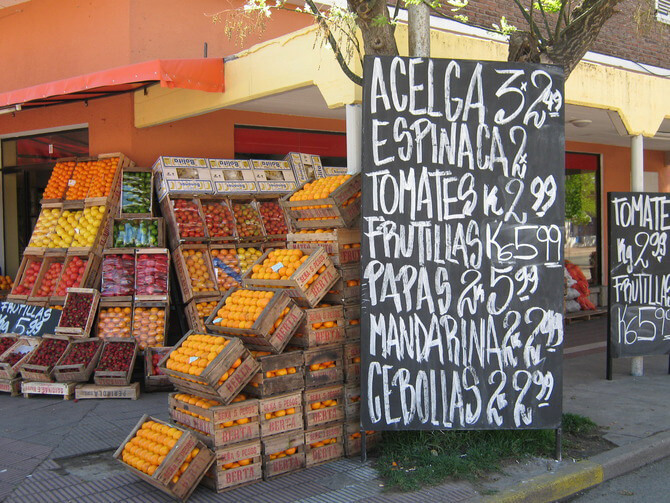Moving and Sending a Child to School in Argentina
Article and photos by Molly McHugh

|
|
A typical fruit stand in Buenos Aires.
|
Argentina is one of the best destinations in South America to live abroad as a family, yet it is not without its challenges. There are large, English-language speaking communities in a few select areas such as Buenos Aires, Mendoza, and Bariloche — but outside of these areas of tourists and expat hot zones, Spanish is spoken almost exclusively, so establishing relationships with local families can be challenging at times. In addition, bilingual schools offering English-speaking staff are expensive (US$12 to US$20k+ per year, with inflation driving up prices at any time, as with all life in this country, though often countered by a strong U.S. dollar).
Nonetheless, in most other aspects, Argentina will awe and inspire you. From the majestic mountain ranges of Patagonia to the back-country river streams to the relentless Atacama Desert to the non-stop buzz of street life in cities and large towns — your family will never be short of options for educational, entertaining, and highly worthwhile activities.
Tourist Visa vs. Applying for Residency
Citizens of the U.S. now do not need a visa for visits of up to 90 days on vacation or business. Contact your Argentinean embassy if you wish to stay longer, as the regulations are subject to constant change. In the past, there was a visa entry fee, which has now been waived, and after three months, you must leave the country, get an exit stamp in your passport, then turn around and re-enter with a new, 90-day tourist stamp.
Some long-term visitors choose to live in Argentina (legally) for long periods in this. Others let their visa expire and then pay a fine when leaving the country. You can purchase property with only a Tourist Visa, and owning property is still the best way to gain permanent residency.
Your other option is to become a resident of Argentina. If you choose to seek residency, you cannot home-school — it is illegal. Federal law in Argentina mandates that all children have to attend school. A few advantages of becoming a resident are being able to purchase a car, own a business, low-cost college tuition for your children, and never having to leave the country to update a visa.
Selecting a School and Enrolling Your Child
The primary reason most families relocate to major metropolitan areas such as Buenos Aires, Córdoba, Mendoza and Bariloche is 2-fold:
-
There are more English-language speakers in these areas due to businesses that cater to tourists and expats from the U.S., England, Canada, and others who have chosen to call the area home.
-
The availability of bilingual elementary, secondary, and preparatory schools.
A primary consideration is that the school year runs from March to December. The summer holiday is from December to March. It will, therefore, be difficult for you to end a school year if you live in the U.S. and then keep on the same track in Argentina. Many bilingual schools fill up their early enrollment, so it is next to impossible to enroll during the school year. Depending upon your child's ability and age, they will either advance or partially repeat a grade level when entering the school system in Argentina.
This can work in your favor as it gives you time to adjust to a new area and have your children take private Spanish classes to prepare them for the challenges of a bilingual program. There is one private, bilingual school (Elementary, Secondary and High School) in Buenos Aires that operates on the American system with the school year beginning in August, The Lincoln School — a great option for those who can afford it. Annual tuition starts at approximately US15k per year plus a US$2.8k per child enrollment fee.
Renting an Apartment in Argentina
You can rent an apartment in Argentina month-to-month as in the U.S. or Canada, but this differs from the norm. You must pay a few months' rent and/or a hefty deposit. I recommend you leave the typical expatriate locales (where most tourists congregate, such as Buenos Aires, Mendoza, and Bariloche) and head out of town some distance to a less populated area. Make friends with a few locals or visit an Immobilaria (real estate office) in your most conservative travel attire, and you should have options available in no time.
In areas overrun by tourists, you will likely be required to have a "guarantee" to rent. A guarantee is a person in Argentina who owns the property and will co-sign the lease for you. Of course, that would be impossible for someone new to the country. Also, by law, a permanent (unfurnished) apartment can be rented for up to two years. Some will accept that instead of the guarantee if you pay a full year of rent upfront.
There are many apartment brokers who specialize in renting to foreigners and can help you arrange a short- or long-term (furnished) rental. In Buenos Aires, contact one of many home or apartment rental agencies for assistance
The Comforts of Home and Food
in Argentina
Even though my son and I have lived abroad in various locations for over five years, we are both guilty of "Americanizing" our experience of a new culture at times, comparing this or that to its counterpart in the U.S. For Argentina, it was the bacon (pancetta, from the Italian). "The bacon is better in the States," my son said while thoroughly enjoying his B.L.T. A bit more salty and with a more hickory flavor than we are used to, eating this favorite food was a new and different experience.

|
|
Pizza Calabresa
, a specialty in Argentina.
|
Moving to a new culture will always bring changes and an element of "missing the comforts of home," especially for a child. Pizza has become a classically adopted American favorite food. Yet, when sitting and surveying the menu at most restaurants in Argentina, you will not find pepperoni listed. Ask for "Pizza Calabresa," the closest and most delicious pie that contains linguiça — a Portuguese pork sausage similar to chorizo, spiced with onion, garlic, and paprika and dry cured with red wine. It tastes like pepperoni, so your kids will not feel deprived.
Argentines indeed consume large amounts of beef in their diets. Still, it is also true that the country is accessible to those who are not carnivores by inclination. Pasta is a diet staple, with fresh spinach linguini and other homemade pastas available in corner groceries and most restaurants. The complexity of the mix of lettuce plus vegetables (venduras) and other toppings, such as tuna, will vary. Still, healthy and tasty salads are always available.
Fresh vegetable and fruit stands are located in every area, with many items to choose from. In addition, natural food stores are present even in small communities with a regular selection of bulk staples such as black beans, brown rice (arroz integral), dried fruits, nuts, etc. Non-traditional food aficionados can live very happily in Argentina.
Activities for Families and Children
From cultural events to adrenalin-producing activities, Argentina has it all. Museums, movie theaters, live theatre, bungee jumping (Salta), paragliding (Córdoba), white river rafting (Mendoza), fly-fishing (Bariloche), and snow and water sports are all popular. During the winter, skiing and snowboarding are practiced at many resorts. If you are tempted, visit Ski Resorts in Argentina to plan a trip.
Surfing is popular during the summertime on the Atlantic coast in Mar del Plata and many smaller towns one to three hours away. San Roque is a lake in Villa Carlos Paz, just 20 minutes from the second largest city in the country, Córdoba, where you can wind and kite surf.
Sports are an integral part of the many extra-curricular activities of families in Argentina, and you will have numerous options for your children to acquire new skills while having a good time. Skateboarding and BMX parks are popular, as are soccer, tennis, rugby, fishing, volleyball, basketball, Polo, horseback riding, biking, and swimming. In cities and most small towns, local parks have play areas with slides for younger children.
Our only unpleasant experience is my 12-year-old son's efforts to play in the local soccer league. After six weeks of enthusiastic, hard work — diligently showing up for evening practices in chilly weather — he was only allowed to play in one game, for less than five minutes before the whistle blew, signaling the match's end. My son decided he could make much better use of his time — and have more fun — skateboarding with his other new friends. My son has never quit any activity he initiated during his youth. Yet, it was painfully obvious he wasn't welcome as an equal participant on the soccer team. Whether the bias was anti-American or for some other reason, the coach's assurances when we signed up that all children got to play at least twenty minutes per game were obviously not going to be honored. Of course, such experiences can happen in your home country, as well.
Life abroad will not be without its pitfalls. As a foreigner, you may be subject to mistreatment and discrimination — in the same way as in your country of origin.
Our experiences as an expat family living in Argentina for the past eight months have been overwhelmingly positive. Once the basic requirements to rent an apartment, set up internet service, find staple food items outside the Argentinean norm, and make new friends and acquaintances — daily life was delightful.
Next on our agenda is an invitation to go hunting (no guns) with Galgos (similar to Greyhounds) — a breed of dog that can run up to 40 miles per hour and is supposedly owned by Cleopatra and Frederich the Great — in search of the elusive Liebres americanas (Jackrabbits).
Molly McHugh is a mother of a well-traveled who spent nine years on the road, mainly in South America, engaging in cultural and educational travel.
|
